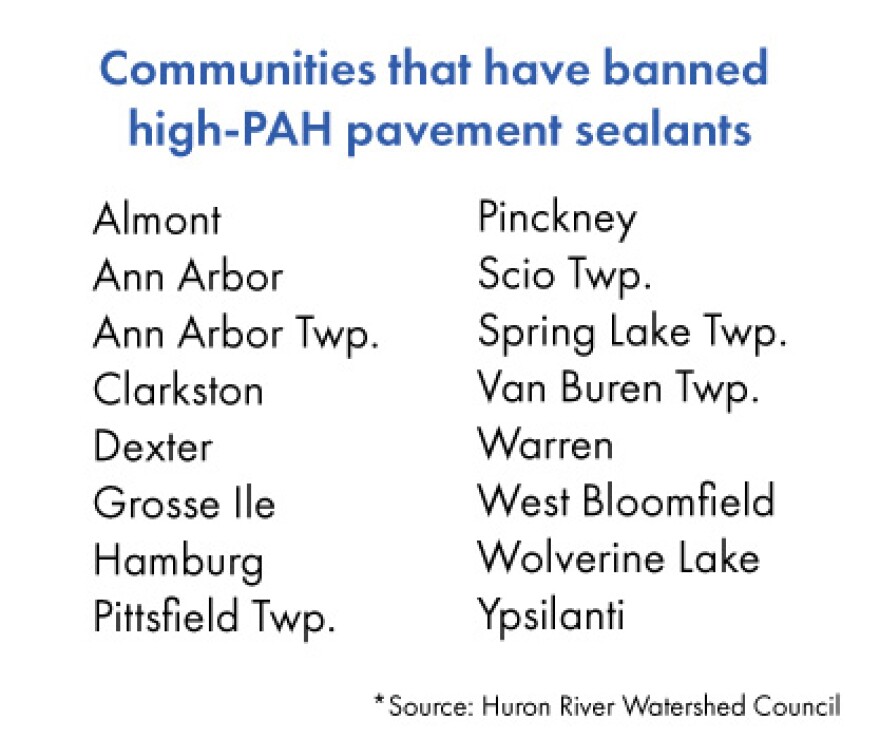Researchers are finding some of the chemicals used in pavement and driveway sealants are making their way into the environment. That could be putting the health of people and aquatic life at risk.
These chemicals are called Polycyclic Aromatic Hydrocarbons, PAHs. They’re commonly found in low levels just about anywhere something is burned. But, the levels of PAHs are much, much higher in certain pavement sealing products, coal tar based sealants.

"It's not only used on parking lots but also residential driveways. We see it used on trails even on playgrounds sometimes. And that legacy is going to continue to contaminate our streams and our stormwater ponds and our homes," said Rebecca Esselman, Executive Director of the Huron River Watershed Council.
She was showing me some retention ponds where rain washes off of acres of parking lots at a large shopping mall. PAHs from pavement sealants get washed into these kinds of retention ponds.
She says “our homes” because we walk on parking lots. If they’re covered with coal tar-based sealants, we’re picking up dust particles with PAH compounds and tracking them into the house.
“From the human health impacts, when it moves into our homes, it ends up in our carpet, in our flooring, and unfortunately that's where our children and our pets are spending a lot of time. So they are at increased risk of exposure to PAHs in their homes,” Esselman explained.
The U.S. Geological Survey says that can lead to an elevated potential cancer risk, particularly for young children. Health professionals have linked PAH exposure to an increased risk of lung, skin, bladder, and respiratory cancers.
The USGS says PAHs cause lesions on fish and damage the DNA of organisms at the bottom of the food web.
The state has been sampling different parking lots and nearby retention ponds. Sam Noffke is an aquatic biologist with the Michigan Department of Environment, Great Lakes, and Energy.

He says almost all of the parking lots that have been tested had high levels of PAHs.
"Right about a thousand times more concentrated in those coal tar sealants than they are in let's say asphalt sealants," Noffke said.
Of eleven retention ponds tested, six had PAH levels above the screening guideline of just under 23 parts per million. One tested at 800 parts per million.
Contractors have an alternative. As he mentioned, asphalt sealants are much lower in PAHs and cost about the same.
"There's probably not much difference between coal tar sealant products and asphalt," Noffke said.
An industry representative says asphalt cannot replace coal tar sealants.
"Because it doesn't do the same job it doesn't provide the same level of protection from chemical insult and petroleum insult and the like,” said Ann LeHuray, the Executive Director of the Pavement Coatings Technology Council. That’s a trade group made up of manufacturers and suppliers of pavement maintenance products, including coal tar sealants.
She also says coal tar is a by-product of many of the industries in Michigan. It’s easy to get in this region. She adds coal tar sealant can be applied in colder weather, extending the work season for companies.

Her group disputes scientists and government agencies when they say coal tar sealant is a problem.
“We haven't observed the theoretical problems that people are saying could happen,” LeHuray said.
She says suggested bans are a ‘solution looking for a problem.’
Back at the detention pond, Rebecca Esselman with the Huron River Watershed Council says the parking lot owners should be asking pavement sealers whether they’re using coal tar based sealants. She says PAHs that settle in the sediment of detention ponds could someday cost the owners.
“To responsibly dispose of those sediments, as they get more and more contaminated with PAHs, that comes at a cost to the detention pond owner and those costs are very significant,” she said.
Most retailers have stopped carrying coal tar sealants because of the concerns about exposure to high PAH levels.

Bills to ban high-PAH sealants have been introduced in the Michigan legislature. They haven't gotten anywhere. There is legislation before lawmakers now, but it’s unclear whether it will be given a hearing.
Seventeen cities in Michigan have banned the use of sealants with high PHA levels.

"Currently we have a situation where municipalities are banning the application of coal tar sealants in a limited patchwork way," said Christe Alwin with the Department of Environment, Great Lakes, and Energy. That offers the potential for water quality benefits in a limited way, "but a statewide ban would then allow for consistent sale and use statewide versus just in limited portions of the state," she added.






